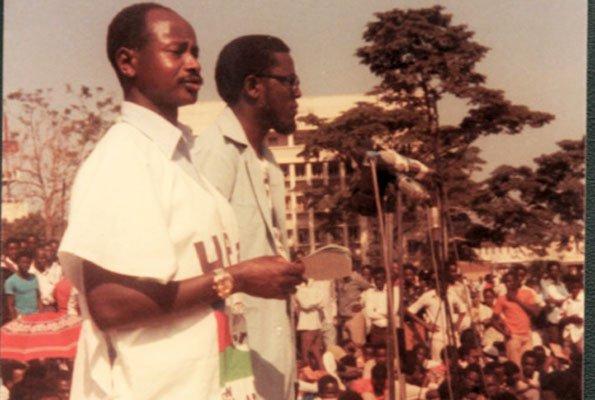Political trouble beset Uganda from the time of independence in 1962. The problems were predominantly tribal, emanating in no small degree from the arbitrary boundaries traced by British colonial administrators who paid scant attention to ethnic and tribal oddities.
Britain’s hope, at the time of independence, rested in a federal relationship between the kingdoms and a central government. A political marriage between the Buganda Kabaka Yekka (Only the King) and Uganda Peoples’ Congress (UPC) meant the first president was the Kabaka (king) of Buganda, Sir Edward Mutesa or King Freddie as he was popularly called. The Prime Minister and executive head of Government was a young trade unionist from the northern Lango tribe; Milton Obote.
In 1964, the coalition between Mutesa and Obote collapsed over the imposition, against Mutesa’s will, of a referendum to decide the fate of two “lost counties”. Residents of the two counties voted overwhelmingly in favour of their return from Buganda to Bunyoro.
Obote saw himself as an intellectual African messiah in the Nkrumah‐of‐Ghana mold. To that end he purchased for himself a doctorate of philosophy and, in 1966, made a successful bid for absolute power. He suspended the Independence Constitution, abolished the tribal kingdoms and declared the country a republic and himself President.
Fast forward, in 1971, well aware that President Milton Obote was planning to arrest him for misappropriating army funds, Amin launched a military coup and declared himself President on 25th January.
Yoweri Museveni then a student and his colleagues as well as Mwalimu Nyerere of Tanzania were sure that Uganda’s political climate had taken on a darker hue.
As Amin’s rule progressed into the 70’s, the dreams of this heavyweight boxer, flyweight philosopher and seemingly punch-drunk President, transformed life in Uganda into a nightmare of terror for inhabitants of all hues.
With unrest growing among Ugandans Amin attempted to annex Tanzania’s Kagera Region on 30th October 1978. In little over 2 weeks, the entire Kagera salient was occupied by Amin’s Uganda Army.
Nyerere long fed up of Amin’s insolence mobilized the Tanzania People’s Defence Force (TPDF). In a few weeks, the Tanzanian army was expanded from less than 40,000 troops to over 150,000.
The Tanzanians were joined by several anti-Amin groups consisting of Ugandans in exile, who at a conference in Moshi (Moshi Conference) had united as the Uganda National Liberation Army (UNLA). These included Kikosi Maalum (Special Force) commanded by Tito Okello and David Oyite Ojok – these were loyal to Obote, FRONASA (Front for National Salvation) commanded by Yoweri Museveni, and Save Uganda Movement commanded by Akena p’Ojok, William Omaria, and Ateker Ejalu.
The FRONASA faction, though not carrying the same favour with Mwalimu as Obote’s Kikosi Maalum, was largely made up of “intellectuals” – the intelligentsia from Western Uganda. FRONASA under Yoweri Museveni had a clear vision for Uganda. Yoweri Museveni in many missives clearly understood the bottlenecks hindering Uganda’s progress from a backward undemocratic state to a prosperous free state.
FRONASA, unlike especially Kikosi Maalum, had a “correct military line – a military line in consonance with the actual situation; a military line that avoids adventurism and eschews subjectivism at the same time.”
On Wednesday April 11th 1979, TPDF took Kampala. After 8 long years,“Idi Amin’s sadistic and primitive regime” was no more. The TPDF drove the last pro-Amin forces from Uganda on 3rd June when it reached the Sudanese border.

In 1980 elections were held in Uganda for the first time since 1962. Obote and his clique robbed them. They failed to learn from Nyerere’s Pan African ideology. This time Ugandans would not wait 8 years. As Dr. Kiseka wrote: “a flicker of light and a ray of hope began to appear in our midst. That flicker and hope was the Popular Resistance Army (PRA) which started fighting against the Obote system in February 1981.” The PRA was formed by members of FRONASA. It was led by Museveni.
Today 11th April 2019 marks exactly 40 years since FRONASA – on whose ideology Uganda People’s Defence Forces is built – helped in Idi Amin’s fall. May this 40th anniversary of the fall of Amin’s dictatorship cajole us into rejecting the backwardfalsehoods being told by many of Uganda’s opposition politicians about the alleged lack of democracy in our motherland, they sound like the bourbon who learnt nothing and forgot nothing.
On this day, may all peace loving Ugandans be reminded of how far we have come as a country both in democracy and development ever since the overthrow of Idi Amin, most especially seven years later from 1986 when a breeze of Fundamental Change swept across Uganda bringing along tranquility, equality, democracy, development and steady progress from then to date.
By Besi Ndereya
Besi Ndereya is a Communications Assistant at Government Citizen Interaction Centre (GCIC), Ministry of ICT & National Guidance.







Comments